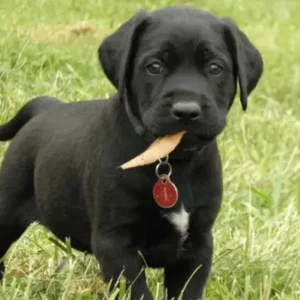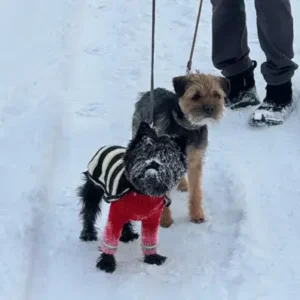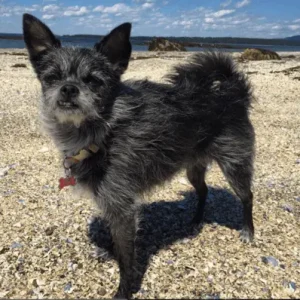Chiweenie History/Origin
The Chiweenie, a charming mix of Chihuahua and Dachshund, has a relatively brief history compared to its parent breeds.
The Chihuahua is believed to have origins in Central America, potentially descending from a native dog called Techichi, used by the Aztecs for spiritual purposes. After the Aztec Empire fell in the 1500s, these dogs were rediscovered in Chihuahua, Mexico, giving the breed its name.
Chihuahuas became popular in the U.S. after musician Xavier Cugat was often seen with one, and they were recognized by the American Kennel Club (AKC) in 1904.
The Dachshund, known for its distinctive long body and short legs, originated in 16th-century Germany. Its name translates to “badger hound,” reflecting its history as a badger hunter. Dachshunds come in various sizes and coat types, evolving from crosses with breeds like the Pinscher and French Pointer. They were officially registered with the AKC in 1885.
Chiweenie Personality
Chiweenies are one of the dog breeds known for their lively, affectionate, and energetic personalities. They love to play and form strong bonds with their families, often becoming very attached to one specific person. Despite their small size, Chiweenies have big personalities and aren’t afraid to show it. They are surprisingly good watchdogs, alerting their owners to anything unusual.
These pups are intelligent, curious, and thrive on attention, often balancing their playful energy with plenty of cuddle time. Their spirited and loyal nature makes them excellent companions for both individuals and families.
- Potential Challenges
While Chiweenies are lovable and fun, they come with a few challenges. They can have a stubborn streak, especially if they take after the independent Dachshund side. This means early socialization and consistent training are crucial to help them get along with strangers and unfamiliar animals. Chiweenies can also be quite vocal, frequently barking to alert their owners to potential concerns.
Their deep attachment to their owners can lead to separation anxiety when left alone for long periods. While they have plenty of energy, their small size makes them more suited for indoor living, and they may require mental stimulation to avoid boredom.
Chiweenie Physical Appearance
The appearance of Chiweenies can vary greatly due to the different sizes and types of Chihuahuas and Dachshunds. However, they typically have a long body like a Dachshund, with short legs and a rectangular-shaped torso.
- Size
These hybrid dogs generally grow to a height of 6 to 10 inches and weigh between 5 to 12 pounds. They reach their full adult size within 2 to 3 years. Despite their small stature, they have a sturdy, well-proportioned build.
- Coat color
Chiweenies display a wide range of coat and color variations from their Chihuahua and Dachshund lineage. Their coats can be short and smooth or longer if they inherit a long-haired gene, particularly from the Chihuahua side. Some rare Chiweenies may even have a wire-haired coat from their Dachshund parent.
In terms of color, Chiweenies can be found in solid shades like black, brown, cream, chocolate, or white, as well as bicolor patterns such as black and tan or brown and tan, and tricolor combinations like black, tan, and white. They may also exhibit unique coat patterns, like brindle with lighter and darker stripes or the dapple pattern with irregular spots inherited from the Dachshund.
Tricolor Chiweenie- Source: chiweenie.milo
Fawn Chiweenie- Source: __leoleo____
Brown and White Chiweenie- Source: __leoleo____
White Chiweenie with tricolor spots- Source: rescuedgirlgang
Chiweenie Gender Differences
Like many dog breeds, female Chiweenies are typically smaller than males, measuring 8 to 12 inches in height and weighing 5 to 8 pounds. Their petite size makes them ideal for various living situations, including apartments.
In comparison, male Chiweenies are generally a couple of pounds heavier, often falling between 8 to 12 pounds. This size difference can affect their overall appearance and temperament, with males sometimes exhibiting a more robust build than females.
Chiweenie Feed/Nutrition
Feeding a chiweenie requires a well-balanced, high-quality diet tailored to its small, active needs. Adult chiweenies typically need ½ to 1 cup of food daily, divided into two meals, while puppies should eat 3-4 times a day, with portions adjusted for growth.
High-quality dry kibble for small breeds is ideal, and wet food can be added occasionally but should be monitored for fat content. Focus on high-quality animal protein for energy, along with healthy fats for coat health, and nutritious carbohydrates like sweet potatoes. You can also occasionally offer shrimp as a tasty and protein-packed treat, just be sure to remove the shell and avoid any seasoning.
Incorporate fiber for digestion and ensure the diet includes essential vitamins and minerals. Be mindful of overfeeding since Chiweenies are prone to weight gain; maintain a set feeding schedule to promote a healthy weight.
Chiweenie Health
The Chiweenie breed is susceptible to some of the same health conditions as its parent breeds, the Chihuahua and Dachshund. While most Chiweenies are generally healthy, they may be prone to specific health issues, making it crucial to provide good care and regular veterinary checkups. Here are some common health problems Chiweenies may face:
- Hypoglycemia: Also known as low blood sugar, hypoglycemia is a concern due to Chiweenie’s small stomach. This condition can cause weakness and lethargy. To manage this, ensure your Chiweenie eats regular meals and consult your vet for advice on diet and monitoring blood sugar levels.
- Diabetes: This condition often develops after hypoglycemia and requires lifelong management. Dogs with diabetes may exhibit increased thirst and urination. Work closely with your veterinarian to establish a treatment plan, which may include insulin therapy and dietary adjustments.
- Degenerative Disc Disease: This spinal condition can lead to serious injuries or paralysis and is common in Dachshunds as well. It’s important to limit strenuous activities that could strain the spine, such as jumping or climbing. Regular vet check-ups can help monitor your Chiweenie’s spine health.
- Dental Issues: Small dog breeds, including Chiweenies, are prone to dental problems. Maintaining good oral hygiene through regular brushing and providing dental treats can help prevent these issues. Schedule professional dental cleanings with your veterinarian to ensure optimal oral health.
- Hypothyroidism: This condition occurs when the thyroid gland is underactive, affecting metabolism and energy levels. If you suspect your Chiweenie may have hypothyroidism, consult your veterinarian, who can perform tests and prescribe appropriate medication to manage the condition.
- Knee and Joint Issues: Many breeds, including Chiweenies, can experience knee and joint problems, particularly as they age. To support joint health, consider providing supplements, ensuring they maintain a healthy weight, and limiting high-impact activities. Regular veterinary check-ups can help detect and address joint issues early.
Chiweenie Care and Grooming
Caring for a Chiweenie requires attention to their grooming, exercise, feeding, and health needs to keep them healthy and happy. While they are relatively low-maintenance compared to larger breeds, consistent care is essential, especially in grooming, dental health, and exercise.
To maintain a consistent grooming routine, ensure your Chiweenie looks and feels their best. Short-haired Chiweenies only need to be brushed once a week to remove loose hair and keep their coat sleek.
In contrast, long-haired Chiweenies should be brushed 2-3 times a week to prevent tangles and matting; using a slicker brush or comb designed for longer coats works best. If your Chiweenie has a wiry coat, brushing 2-3 times a week is recommended, along with occasional hand-stripping to maintain their coat’s texture.
Bathing should occur every 4-6 weeks or as needed if they get dirty. It’s important to use a gentle, dog-friendly shampoo to keep their skin and coat healthy, as over-bathing can lead to dry skin.
Regular nail trimming is essential since Chiweenies’ nails grow quickly; aim to trim their nails every 2-4 weeks to prevent overgrowth and discomfort. If you can hear their nails clicking on the floor, it’s time for a trim.
Chiweenies can be prone to ear infections, so it’s crucial to check and clean their ears regularly. Use a vet-approved ear cleaning solution to wipe away any dirt or wax buildup, and ensure their ears stay dry to prevent infections.
Due to their small mouths, Chiweenies are also prone to dental issues, making daily or at least weekly tooth brushing with dog-safe toothpaste crucial. Providing dental chews can help maintain good oral hygiene.
In addition to grooming, leash training your dog is essential for safe walks and helping them develop good walking habits from an early age.
Chiweenie Rescue Groups
Rescuing a Chiweenie can be a rewarding experience, as many dogs are looking for loving homes. You can often find Chiweenies in shelters or rescue centers dedicated to their parent breeds, the Chihuahua and Dachshund. Adopting from these facilities not only gives a dog a second chance but also helps alleviate the pressure on local animal shelters. For more information on adopting a Chiweenie or finding specific rescues, check local shelters or breed-specific organizations.
Chiweenie Price
Prices typically range from $200 to $2,000, depending on the dog’s lineage and location. You can also find Chiweenies for sale through reputable pet adoption websites. For those looking to adopt, check rescue centers specific to the Chihuahua and Dachshund breeds, as they may have Chiweenies available. Always be cautious of scams when searching for puppies online.
Interesting Facts
- Apart from those born in the same litter, Chiweenies typically have distinct appearances from one another. Both Chihuahuas and Dachshunds can vary greatly in looks, making it difficult to predict how a specific litter will turn out.
- Tuna is a famous Chihuahua-Dachshund mix who became an internet sensation after being adopted by Courtney Dasher. He was found abandoned near San Diego and gained popularity on Instagram after a photo of him led to a surge in followers.
Tuna- Source: Wikipedia
Best For
Chiweenies make excellent pets for individuals or families looking for a small, energetic, and affectionate companion. Their playful and loyal nature means they thrive in environments where they receive plenty of attention and interaction. Additionally, they adapt well to apartment living and can suit a variety of lifestyles, making them great for active individuals as well as those seeking a cuddly buddy at home.
Top Names
| Male Chiweenie Names | Female Chiweenie Names |
| Taco | Churro |
| Nacho | Bella |
| Gizmo | Pixie |
| Beans | Coco |
| Pippin | Luna |









 Chihuahua – Source:
Chihuahua – Source:  Dachshund – Source:
Dachshund – Source: 

 Tricolor Chiweenie- Source:
Tricolor Chiweenie- Source:  Fawn Chiweenie- Source:
Fawn Chiweenie- Source:  Brown and White Chiweenie- Source:
Brown and White Chiweenie- Source:  White Chiweenie with tricolor spots- Source:
White Chiweenie with tricolor spots- Source: 
 Tuna- Source:
Tuna- Source: 






